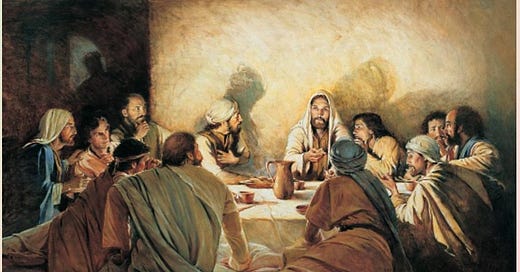Isaiah 49:1-6; Psalm 71:1-2, 3-4a, 5ab-6ab, 15 and 17; John 13:21-33, 36-38
Psalm 71 is often called “a prayer in old age”. The psalmist, who has been faithful to God from the womb of his mother (Ps 71:6) asks God not to forsake him as he reaches the end of his life (Ps 71:18). Our Lord Jesus was faithful to the Father all his life. He came into this world to do the Father’s will (see Heb. 10:5-9). But, as we hear in today’s Gospel his life comes to an end and is going to be a tragic end. One of his disciples would betray him, another one would deny knowing him, and he would feel abandoned even by God (see Matt 27:46).
In the first reading, we hear a part of the second song of God’s servant (Is 49:1-9). The servant feels depressed and thinks that he “had toiled in vain, and for nothing, uselessly, spent [his] strength” (Is 49:4). Our Gospel today begins with declaring that Jesus was deeply troubled (John 13:21). How could one of his disciples betray him for money? The cross which Jesus was about to embrace would seem like a failure to many people. The Jews considered it a scandal. They could not comprehend why the Messiah had to die such a horrible death. On the other hand, for the Greeks the cross was foolishness. Why would any god attempt to save the world through the death of a Jew?
But, the voice of the Lord overrides the doubts of the servant. His effort was not in vain. Moreover, the Lord enlarges the scope of his mission. It is not confined to Israel alone, but it needs to embrace the whole world (Is 49:6). We discern in this passage the message of the Gospel. When Judas left the company of disciples to betray Jesus, our Lord did not speak about failure but about glorification: “Now is the Son of Man glorified, and God is glorified in him” (John 13:31). What on the surface looked like a failure was the greatest victory the world has ever known. The crucifixion of the Son of God was His glorification.
On the road to Emmaus, the risen Christ explained to his disciples that it was necessary “that the Christ should suffer these things and enter into his glory” (see Luke 24:26). And then, he instructed them that “repentance for the forgiveness of sins should be proclaimed” in the name of the crucified and risen Christ “to all nations, beginning from Jerusalem” (see Luke 24:47). Jesus is the propitiation “for the sins of the whole world” (see 1 John 2:2).
The psalmist promises to declare God’s salvation all day long (see Ps 71:15). That is the mission of the Church. We declare God’s salvation all day long in liturgy and in proclaiming the Gospel through words and actions. It is through the testimony of the Church that God’s salvation reaches “to the ends of the earth” (Is 49:6).




